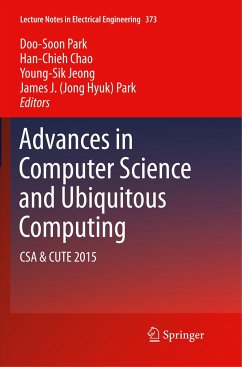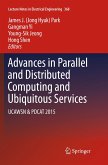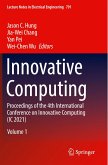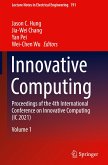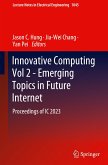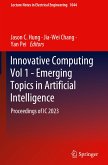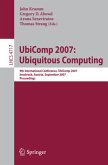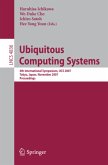Advances in Computer Science and Ubiquitous Computing
CSA & CUTE
Herausgegeben:Park, Doo-Soon; Chao, Han-Chieh; Jeong, Young-Sik; Park, James J. Jong Hyuk
Advances in Computer Science and Ubiquitous Computing
CSA & CUTE
Herausgegeben:Park, Doo-Soon; Chao, Han-Chieh; Jeong, Young-Sik; Park, James J. Jong Hyuk
- Broschiertes Buch
- Merkliste
- Auf die Merkliste
- Bewerten Bewerten
- Teilen
- Produkt teilen
- Produkterinnerung
- Produkterinnerung
This book presents the combined proceedings of the 7th International Conference onComputer Science and its Applications (CSA-15) and the International Conference onUbiquitous Information Technologies and Applications (CUTE 2015), both held in Cebu, Philippines, December 15 - 17, 2015.
The aim of these two meetings was to promote discussion andinteraction among academics, researchers and professionals in the field ofcomputer science covering topics including mobile computing, security and trustmanagement, multimedia systems and devices, networks and communications,databases and data mining,…mehr
Andere Kunden interessierten sich auch für
![Advances in Parallel and Distributed Computing and Ubiquitous Services Advances in Parallel and Distributed Computing and Ubiquitous Services]() Advances in Parallel and Distributed Computing and Ubiquitous Services75,99 €
Advances in Parallel and Distributed Computing and Ubiquitous Services75,99 €![Innovative Computing Innovative Computing]() Innovative Computing186,99 €
Innovative Computing186,99 €![Innovative Computing Innovative Computing]() Innovative Computing186,99 €
Innovative Computing186,99 €![Innovative Computing Vol 2 - Emerging Topics in Future Internet Innovative Computing Vol 2 - Emerging Topics in Future Internet]() Innovative Computing Vol 2 - Emerging Topics in Future Internet164,99 €
Innovative Computing Vol 2 - Emerging Topics in Future Internet164,99 €![Innovative Computing Vol 1 - Emerging Topics in Artificial Intelligence Innovative Computing Vol 1 - Emerging Topics in Artificial Intelligence]() Innovative Computing Vol 1 - Emerging Topics in Artificial Intelligence164,99 €
Innovative Computing Vol 1 - Emerging Topics in Artificial Intelligence164,99 €![UbiComp 2007: Ubiquitous Computing UbiComp 2007: Ubiquitous Computing]() John Krumm (Volume ed.) / Gregory D. Abowd / Aruna Seneviratne / Thomas StrangUbiComp 2007: Ubiquitous Computing38,99 €
John Krumm (Volume ed.) / Gregory D. Abowd / Aruna Seneviratne / Thomas StrangUbiComp 2007: Ubiquitous Computing38,99 €![Ubiquitous Computing Systems Ubiquitous Computing Systems]() Haruhisa Ichikawa (Volume ed.) / We-Duke Cho / Ichiro Satoh / Hee Yong YounUbiquitous Computing Systems38,99 €
Haruhisa Ichikawa (Volume ed.) / We-Duke Cho / Ichiro Satoh / Hee Yong YounUbiquitous Computing Systems38,99 €-
-
-
This book presents the combined proceedings of the 7th International Conference onComputer Science and its Applications (CSA-15) and the International Conference onUbiquitous Information Technologies and Applications (CUTE 2015), both held in Cebu, Philippines, December 15 - 17, 2015.
The aim of these two meetings was to promote discussion andinteraction among academics, researchers and professionals in the field ofcomputer science covering topics including mobile computing, security and trustmanagement, multimedia systems and devices, networks and communications,databases and data mining, and ubiquitous computing technologies such as ubiquitous communication and networking, ubiquitous software technology, ubiquitous systems and applications, security and privacy.
These proceedings reflect the state-of-the-art in the development of computationalmethods, numerical simulations, error anduncertainty analysis and novel applications of new processing techniques inengineering, science, and other disciplines related to computer science.
The aim of these two meetings was to promote discussion andinteraction among academics, researchers and professionals in the field ofcomputer science covering topics including mobile computing, security and trustmanagement, multimedia systems and devices, networks and communications,databases and data mining, and ubiquitous computing technologies such as ubiquitous communication and networking, ubiquitous software technology, ubiquitous systems and applications, security and privacy.
These proceedings reflect the state-of-the-art in the development of computationalmethods, numerical simulations, error anduncertainty analysis and novel applications of new processing techniques inengineering, science, and other disciplines related to computer science.
Produktdetails
- Produktdetails
- Lecture Notes in Electrical Engineering 373
- Verlag: Springer / Springer Nature Singapore / Springer, Berlin
- Artikelnr. des Verlages: 978-981-10-9121-6
- Softcover reprint of the original 1st ed. 2015
- Seitenzahl: 952
- Erscheinungstermin: 30. März 2019
- Englisch
- Abmessung: 235mm x 155mm x 51mm
- Gewicht: 1437g
- ISBN-13: 9789811091216
- ISBN-10: 9811091218
- Artikelnr.: 54772423
- Herstellerkennzeichnung Die Herstellerinformationen sind derzeit nicht verfügbar.
- Lecture Notes in Electrical Engineering 373
- Verlag: Springer / Springer Nature Singapore / Springer, Berlin
- Artikelnr. des Verlages: 978-981-10-9121-6
- Softcover reprint of the original 1st ed. 2015
- Seitenzahl: 952
- Erscheinungstermin: 30. März 2019
- Englisch
- Abmessung: 235mm x 155mm x 51mm
- Gewicht: 1437g
- ISBN-13: 9789811091216
- ISBN-10: 9811091218
- Artikelnr.: 54772423
- Herstellerkennzeichnung Die Herstellerinformationen sind derzeit nicht verfügbar.
ProfessorDoo-Soon Park received his PhD in Computer Science from Korea University in 1988. Currently, he is a professor in the Department of Computer Software Engineering at Soonchunhyang University, South Korea. He is President of KIPS(Korea Information Processing Society) and Director of Central Library at Soonchunhyang University and Director of Wellness Service Coaching Center at Soonchunhyang University. He was editor in chief of JIPS(Journal of Information Processing Systems) at KIPS from 2009 to 2012. He was Dean of the Engineering College at Soonchunhyang University from 2002 to 2003, and was the Director of the u-Healthcare Research Center at Soonchunhyang University from 2006 to 2007. He has served as an organizing committee member of international conferences including CUTE 2014, CSA 2014, EMC-14, FutureTech 2014, and MUE 2014. His research interests include data mining, big data processing and parallel processing. He is a member of IEEE, ACM, KIPS, KMS, and KIISE. Contact him at parkds@sch.ac.kr. Professor Hamid R. Arabnia received a Ph.D. degree in Computer Science from the University of Kent (Canterbury, England) in 1987. Arabnia is currently a Professor of Computer Science at University of Georgia (Georgia, USA), where he has been since October 1987. His research interests include Parallel and distributed processing techniques and algorithms, supercomputing, Big Data Analytics and applications in medical imaging, knowledge engineering, security and surveillance systems and other computational intensive problems. Most recently, he has been studying ways to promote legislation that would prevent cyber-stalking, cyber-harassment, and cyber-bullying. Dr. Arabnia is Editor-in-Chief of The Journal of Supercomputing (one of the oldest journals in Computer Science) published by Springer and has been Associate Editor of IEEE Transactions on Information Technology in Biomedicine (2008-2011). He is also on the editorialand advisory boards of 32 other journals. He is the book series editor-in-chief of "Transactions of Computational Science and Computational Intelligence" (Springer) and editor-in-chief of the book series entitled "Emerging Trends in Computer Science and Applied Computing" (Elsevier). Dr. Arabnia has received a number of awards; most recently (2007), he received an "Outstanding Achievement Award in Recognition of His Leadership and Outstanding Research Contributions to the Field of Supercomputing". This award was presented to him at Harvard University Medical School (signatories: Lawrence O. Hall, President of IEEE/SMC; Zhi-Pei Liang, Vice President of IEEE/EMB; Jack. Y. Yang, General Chair of IEEE BIBE and Harvard University; Mary Qu Yang, Chair of Steering Committee, IEEE BIBE and NIH); Distinguished Leadership and Visionary Award. Presented by FTRA (Future Technology Research Association), presented by Steering Committee of CSA-13 International Conference; Distinguished Research Award for his Outstanding Contributions to Adaptable Communication Systems, presented by ACM SIGAPP IMCOM Co-Chairs, 2014. Dr. Arabnia is an elected Fellow, International Society of Intelligent Biological Medicine (ISIBM); he has served on the Advisory Board of IEEE Technical Committee on Scalable Computing (TCSC, 2006-2012). Professor Young-Sik Jeong is a professor in the Department of Multimedia Engineering at Dongguk University in Korea. His research interests include multimedia cloud computing, information security of cloud computing, mobile computing, IoT(Internet of Things), and wireless sensor network applications. He received his B.S. degree in Mathematics and his M.S. and Ph.D. degrees in Computer Science and Engineering from Korea University in Seoul, Korea in 1987, 1989, and 1993, respectively. He was a professor in the Department of Computer Engineering at Wonkwang University in Korea from 1993 to 2012. He worked and researched to Michigan State Universityand Wayne State University as visiting professor in 1997 and 2004 respectively. Since 2002, he has been serving as an IEC/TC 100 Korean Technical Committee member, as the IEC/TC 108 Chairman of Korean Technical Committee, and as an ISO/IEC JTC1 SC25 Korean Technical Committee member. Also He is an EiC(Editor-in-Chief) of Journal of Information Processing Systems, an associate editor of JoS(Journal of Supercomputing), IJCS(international Journal of Communication Systems) and an editor of JIT(Journal of Internet Technology), finally an associate editor of Journal of Human-centric Computing(HCIS) and so on. He is also is a member of the IEEE. Professor James J. (Jong Hyuk) Park received his Ph.D. degree in Graduate School of Information Security from Korea University, Korea. From December, 2002 to July, 2007, Dr. Park had been a research scientist of R&D Institute, Hanwha S&C Co., Ltd., Korea. From September, 2007 to August, 2009, He hadbeen a professor at the Department of Computer Science and Engineering, Kyungnam University, Korea. He is now a professor at the Department of Computer Science and Engineering, Seoul National University of Science and Technology (SeoulTech), Korea. Dr. Park has published about 100 research papers in international journals and conferences. He has been serving as chairs, program committee, or organizing committee chair for many international conferences and workshops. He is a president of the Future Technology Research Association International (FTRA) and Korea Information Technology Convergence Society (KITCS). He is editor-in-chief of Human-centric Computing and Information Sciences(HCIS) by Springer, International Journal of Information Technology, Communications and Convergence (IJITCC) by InderScience, and Journal of Convergence (JoC) by FTRA Publishing. He is Associate Editor / Editor of 14 international journals including 8 journals indexed by SCI(E). In addition, he has been serving as a Guest Editor for international journals by some publishers: Springer, Elsevier, John Wiley, Oxford Univ. press, Hindawi, Emerald, Inderscience. His research interests include security and digital forensics, Human-centric ubiquitous computing, context awareness, multimedia services, etc. He got the best paper awards from ISA-08 and ITCS-11 conferences and the outstanding leadership awards from IEEE HPCC-09, ICA3PP-10, IEE ISPA-11, and PDCAT-11. Dr. Park' s research interests include Digital Forensics, Security, Ubiquitous and Pervasive Computing, Context Awareness, Multimedia Service, etc. He is a member of the IEEE, IEEE Computer Society, KIPS, KICS, KIISC, KMMS, KDFS and KIIT.
I CSA.- 1 Mobile andubiquitous computing.- 2 Dependable, reliable and autonomic computing.- 3 Security and trust management.- 4 Multimedia systems and services.- 5 Networking and communications.- 6 Database and data mining - 7 Game andsoftware engineering.- 8 Grid and scalable computing.- 9 Embedded system andsoftware.- 10 Artificial intelligence.- 11 Distributed and parallel algorithms.-12 Web and internet computing.- 13 IT policy and business management.- II CUTE.- 1 UbiquitousCommunication and Networking.- 2 Ubiquitous Software Technology.- 3 Ubiquitous Systems and Applications.- 4 Ubiquitous Security, Privacy and Trust.- 5 IT Convergence Services.
I CSA.- 1 Mobile andubiquitous computing.- 2 Dependable, reliable and autonomic computing.- 3 Security and trust management.- 4 Multimedia systems and services.- 5 Networking and communications.- 6 Database and data mining - 7 Game andsoftware engineering.- 8 Grid and scalable computing.- 9 Embedded system andsoftware.- 10 Artificial intelligence.- 11 Distributed and parallel algorithms.-12 Web and internet computing.- 13 IT policy and business management.- II CUTE.- 1 UbiquitousCommunication and Networking.- 2 Ubiquitous Software Technology.- 3 Ubiquitous Systems and Applications.- 4 Ubiquitous Security, Privacy and Trust.- 5 IT Convergence Services.

